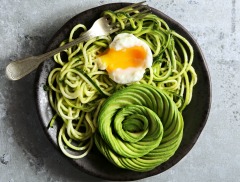Don't just meal plan... meal plan intelligently - with Meal Genius! Sign up for our free newsletter to get delicious recipes, sample meal plans and a whole lot more!
Pumpkin
Pumpkin is a winter squash, related to watermelons and cantaloupe.
Because pumpkins are only available in the fall and early winter, canned pumpkin - solid packed with no added sugar, spices or ingredients - is an excellent way to enjoy this nutritional powerhouse year round. Use canned pumpkin in sauces, smoothies and homemade whole grain bakery recipes.
Pumpkin is low in calories, and an excellent source of beta carotene and fiber, plus a good source of copper, iron, magnesium, potassium and vitamin C.
Antioxidant Score* (ORAC)=483
The Benefits
- Special diets: Autoimmune Paleo Diet, Elimination Diet, Gluten-Free Diet, Gluten-Free/Dairy-Free Diet, Grain-Free Diet, Low Acid Diet, Low FODMAP Diet, Low Histamine Diet, Low Oxalate Diet, Paleo Diet (Light), Paleo Diet (Strict), Pescetarian Diet, Primal Diet, Vegetarian Diet, Whole Food
- Excellent Source of: Fiber, VitaminA, VitaminK
- Good Source of: Iron, Magnesium, Potassium, VitaminC, Copper, Manganese
- Preferences: No Fish, No Red Meat, No Pork, No Eggs, No Shellfish, No Gluten, No Nuts, No Seeds, No Soy, No Dairy, No Poultry, No Corn, No Yeast, No Peanuts, No Molds, No Pseudograins, No Coconut, No Citrus, No Nightshade, No Legumes, No Grains, Low Carbohydrate, Low Cholesterol, Low Fat, Low Sodium, Low Saturated Fat
Related Foods
Related Nutrients
Selecting and Storing
Choose pumpkins that are free from blemishes and heavy for their size. Store whole pumpkins at room temperature up to a month or refrigerate up to 3 months.









